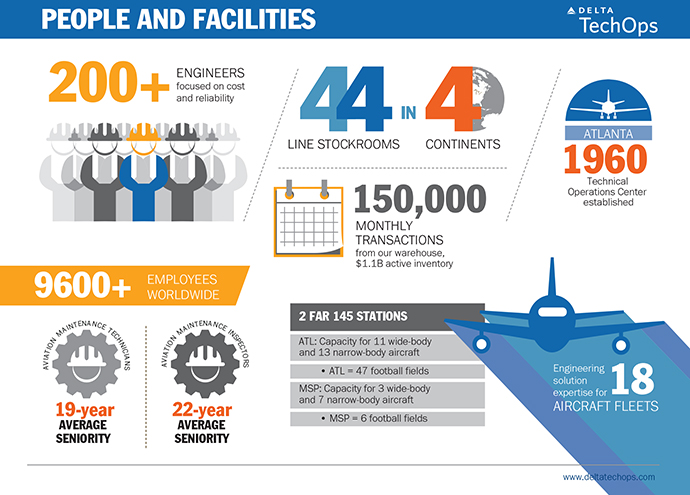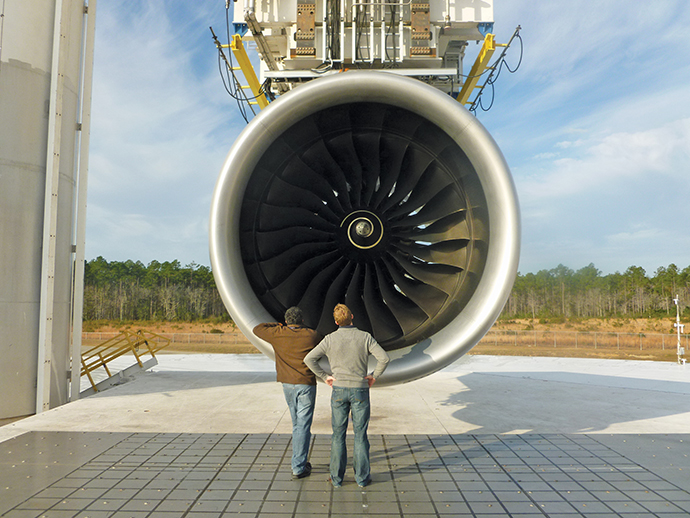Delta TechOps, the maintenance, repair and overhaul (MRO) business of Delta Air Lines, and Rolls-Royce are teaming up, bringing advanced jet engines from Rolls-Royce to a 100,000-sq.-ft. (9,300-sq.-m.) expanded engine shop at Delta’s Technical Operations Center in Atlanta. Rolls-Royce on October 26th named Delta TechOps an approved maintenance center for Trent civil aircraft engines to better serve jet engine customers throughout the life cycle of Rolls-Royce engines for the upcoming generation of aircraft. Delta TechOps will add the Trent XWB and Trent 7000 commercial jet engine types to its MRO portfolio.
“Today’s agreement ensures that thousands of Delta TechOps’ jobs are secure in the decades ahead,” said Richard Anderson, Delta’s CEO. “Rolls-Royce jet engines will not only power Delta’s international fleet of the future, but now TechOps will be available to support many other commercial operators in the Americas and beyond.”
Design work of the expanded engine maintenance facility at Delta’s Technical Operations Center in Atlanta will commence in 2016 with construction expected to begin in 2018. The expansion will include space for all aspects of engine overhaul work including a new test cell, a massive concrete installation where stationary jet engines are run at full thrust. Expanded refurbishment areas for blades and vanes, rotors and dozens of other engine components are also planned.

“We thank the City of Atlanta and Mayor Kasim Reed for championing Delta people and working with us to complete this important deal with a world-class manufacturer like Rolls-Royce,” Anderson said. “Delta is proud to call Atlanta home and remains committed to working with and investing in the City of Atlanta, in academic institutions like Georgia Tech and injecting millions of payroll dollars in the local economy.”
Eric Schulz, Rolls-Royce president – Civil Large Engines, said, “We are excited to announce Delta TechOps as a new independent Approved Maintenance Center as we continue to develop a competitive and capable overhaul network. We know that Delta TechOps will deliver outstanding performance on their own engines and those of other customers.”
Delta TechOps currently overhauls more than 600 jet engines every year at its Atlanta and Minneapolis/St. Paul facilities. Technicians conduct highly technical, specialized work with industry-leading turn times, ranging from a few days to more than one month. Engine components are disassembled, overhauled, fabricated, reassembled and evaluated by state-of-the-art non-destructive testing that inspects components for imperfections in addition to full-thrust runs in test cells.
Measuring more than 2.7 million sq. ft. (250,800 sq. m.), the Atlanta Technical Operations Center drives maintenance and operational reliability for Delta’s fleet of more than 800 aircraft and MRO services for more than 150 operators worldwide, including airframe and component maintenance, a variety of logistical and support services, and engine work. It has served as a primary base for Delta TechOps since the 1960s, adjacent to Hartsfield-Jackson Atlanta International Airport where Delta runs the world’s largest hub airport operation.
Utah Aerospace Pathways Program Takes Flight
Governor Gary R. Herbert, Utah Aerospace industry partners and the Governor’s Office of Economic Development (GOED), announced in September the Utah Aerospace Pathways program, which will provide Utah students the opportunity to graduate high school with a certificate in aerospace manufacturing and begin an aerospace manufacturing career.
“The creation of the Utah Aerospace Pathways program will benefit Utah students for generations to come. This is among the first time industry partners and K-12 educators are working closely together to directly address their workforce needs in the state,” said Gov. Herbert at the announcement, held at the FedEx sorting facility in Salt Lake City. “We look forward to unlocking more opportunities with industry leaders to improve education and to ensure lasting economic growth in Utah.”
The collaboration started in March 2015 with the goal of developing a pilot program for the 2015 school year. The first semester of the program will take place in high schools in Granite and Davis School Districts, while the second semester will take place at Davis Applied Technology College and Salt Lake Community College. Students will also participate in a paid internship during their senior year of high school.
“Improving our education system is the most important thing we can do to build a strong economy for the future,” said Larry Coughlin, general manager of Boeing Salt Lake. “This program provides students who have a passion for technology and innovation the opportunity to become familiar with aerospace manufacturing and get hands-on experiential learning.”
Upon completing the UAP program, along with passing pre-employment requirements, students will be certified to begin work with one of the aerospace partners in Utah. Not only will the students begin work at a family-sustaining wage — many of the industry partners have agreed to provide tuition reimbursements after a minimum of one year working for the company. If the student prefers, they can pursue training within their company and work their way up there.
“We are thrilled for this opportunity to partner with K-12 to train students in aerospace manufacturing,” said Deneece Huftalin, president of Salt Lake Community College. “With this pathway, students will be able to enter the aerospace field with a recognized credential and, when ready, return to the college for additional advanced certificates or degrees.”
The program’s launch has been made possible through the dedication and commitment of several organizations throughout Utah. Davis and Granite School Districts, as well as the State Office of Education (USOE) have worked through the educational requirements, putting the curriculum together and providing the teachers and school counselors with the essentials. SLCC and DATC have also come together to support the second semester of the program, allowing students to take courses at their locations to complete additional certification.
The six aerospace industry partners in Utah are Boeing, Harris, Hexcel, Hill Air Force Base, Janicki and Orbital ATK. The industry partners have worked closely together with the Utah Manufacturers Association to provide paid internships during the certification process and define the requirements to hire these students out of high school. Lastly, the Utah Aerospace Pathways program is a grant recipient of the Utah Cluster Acceleration Partnership (UCAP), a program that provides funding to public educational institutions to develop, implement, or enhance educational programs that are responsive to regional and statewide industry needs. UCAP is a partnership between the Department of Workforce Services, GOED and the Utah System of Higher Education.
UK Airport City Plans Manchester-to-Beijing Link, ‘China Cluster’

Airport City Manchester will soon have a new air link to China and two new business districts designed for Chinese investors in the airport city taking shape at the UK’s third busiest airport by passenger traffic. Chinese carrier Hainan Airlines will fly four times per week between Manchester and Beijing beginning in June 2016. The route was announced during a visit to the UK by Chinese President Xi Jinping in October.
At the same time, plans for two new business districts were unveiled at Manchester Airport City — Wuhan Square and Shenzhen Gardens —launching a £130-million (US$199-million) China Cluster at the 150-acre (61-hectare) development that was unveiled in January 2012. The hope is for the districts to appeal to Chinese companies seeking a UK location, particularly now that nonstop air connectivity to China from the UK will be available outside the London Heathrow catchment area. The new route is forecast to generate more than £250 million ($383 million) in economic benefit to the UK economy over the next decade.
“Manchester Airport is the global gateway for the Northern Powerhouse and both the China Cluster and the new direct route will provide an opportunity for Chinese investors to access the many opportunities available to them in the North,” noted Charlie Cornish, CEO of Manchester Airports Group. “Businesses in the North will also be significant beneficiaries as it will soon become much easier for them to build strong commercial relationships with Chinese partners.”
Wuhan Square comprises 18,600 sq. m. (200,200 sq. ft.) of BREEAM (Building Research Establishment Environmental Assessment Methodology) “Excellent” offices, apartments and retail in a four-building cluster. Shenzhen Gardens comprises three storeys of 1,400 sq. m. (15,000 sq. ft.) BREEAM “Excellent” office space. Blocks are part of a larger, 18,600-sq.-m. (200,000-sq.-ft.) campus.
GKN Aerospace Brings Jobs to Pierce County, Washington
In January 2015, Boeing announced a contract with GKN Aerospace for final assembly and painting of 737 MAX Advanced Technology (AT) Winglets. UK-based GKN selected Sumner, Wash., as the location for a facility where it will assemble and paint the Winglets.
“This is a great win for Sumner, Pierce County and Washington State,” said Bruce Kendall, President and CEO of the Economic Development Board for Tacoma-Pierce County (EDB). “GKN was attracted by the region’s skilled workforce, our unmatched training and education systems for the industry and the excellent proximity to Boeing’s Renton plant, where the 737 MAX will be assembled.”
GKN selected a 57,000-sq.-ft. (5,300-sq.-m.) location in Sumner where a previous tenant had also required a paint plant. The new Winglet production location will employ approximately 75 people at full production, with more possible in the future as the 737 MAX ramps up. Employees will be drawn from Pierce County’s large pool of highly skilled aerospace and composite workers.
Many local colleges have placed an emphasis on educating workers for the aviation industry. Bates Technical College’s Aerospace Joint Apprenticeship Committee Program, and Clover Park Technical College and the Pierce County Skills Center’s Programs with Workforce Central are producing expertly trained and immediately hirable workers for the region’s many aerospace companies.
The 737 MAX is already a huge seller, with 2,600 planes currently on order and more orders coming every month. The Winglets, which will be assembled and painted in the Sumner facility, will help the new plane to be more efficient and reliable.

